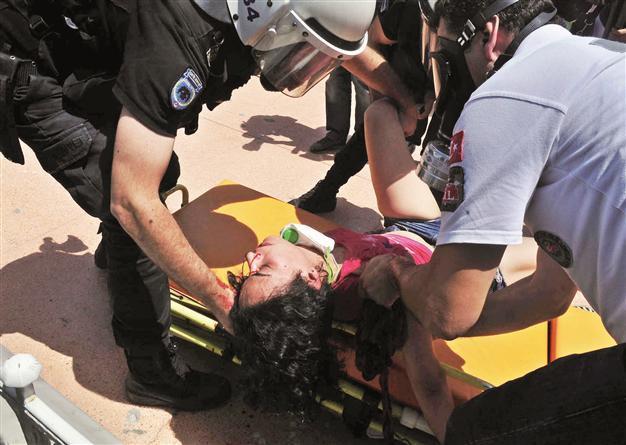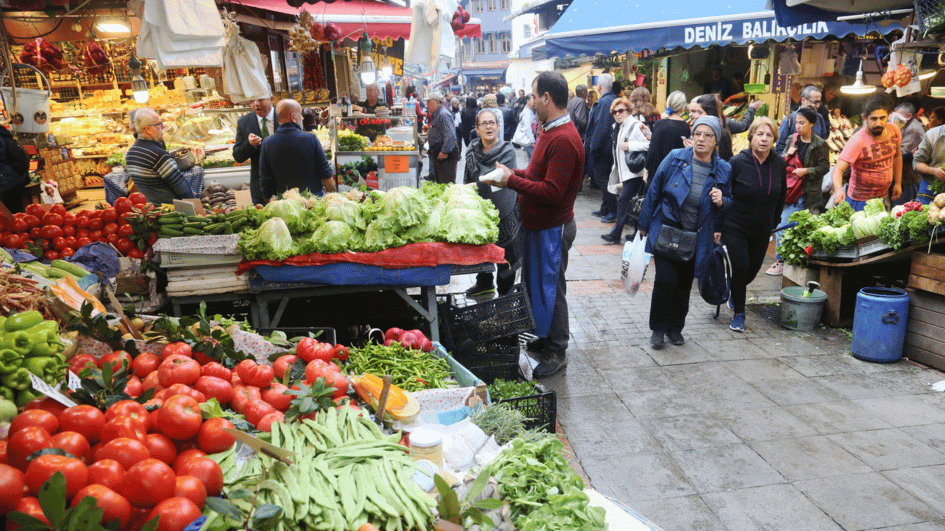Human Rights 101 in Turkey
BELGİN AKALTAN - belgin.akaltan@hdn.com.tr

Lobna Allani, Turkish citizen of Palestinian origin was hit by a gas capsule on the head on May 31 that left her in critical condition. DHA Photo
I was thinking (how many times have I started my column like this?) of naming this piece “The incident vs. incidents” or maybe better “First Lesson for Those Who Plan to Run for Any Public Office in Turkey.”We could also call it “Journalism 101” or “Before Writing a Column.” (Oh God, am I not shooting myself in the foot? Criticizing policies is one thing; criticizing fellow colleagues is another thing. I will surely lose this column and go back to being a nameless, ordinary [but happier] journalist who does not have to strain herself or her readers to write and read a piece every week, trying to find good topics, good sentences, a nice style, some humor – or at least a light tone. Oh God, again, what AM I DOING?) Full stop.
I wish I could “full stop” myself. Anyway, what I’m trying to point out is – Oh God, again, how many times have I used this cliché?
This piece will feature basic knowledge about human rights and the rule of law because so many people in politics and the media seem to be unaware of them. The point is that there is a clear distinction between an incident where two people are fighting on the street and another incident where one or two or more police officers are beating a person on the street. The two incidents cannot be compared in any way. The second incident is a violation of human rights whereas the first one may be the subject of legal proceedings only under certain circumstances. (A street fight often goes unreported unless there is an injury or complaint.)
The state and the government has indirect responsibility in the first incident for not providing a secure street, maybe for not providing adequate lights or not being able to achieve better community policing, but in the second incident, the government is absolutely responsible. There is a direct violation of human rights; there is abuse of power.
OK. I’m oversimplifying it, which suits the purpose of this column. It is a very simple concept.
Human rights have been developed over the years and are protected by several international treaties such as the Universal Declaration of Human Rights and the European Convention on Human Rights.
And of course there is the European Court of Human Rights (ECHR) we are all familiar with.
We people in Turkey seem not to be able to understand or pretend not to understand, or over-politicize this concept of the violation of human rights or abuses of power.
One incident: A young woman with her baby was verbally insulted and physically attacked in the Kabataş neighborhood of Istanbul – allegedly by a group of Gezi protestors. She had bruises on her body; she was traumatized and is suffering from panic attacks. (Hundreds of Gezi people are ready to change places with her.) She is now well enough to talk to journalists. The prime minister frequently mentions this incident in his public speeches. The woman is alive. Both of her eyes are in place. She can talk. She will be able to laugh and enjoy her life soon.
Nothing like Lobna Allani, the Turkish citizen of Palestinian origin hit by a gas capsule on the head on May 31 that has left her in critical condition ever since. She has undergone two brain surgeries. Now, she does not remember anything and does not talk. The gas capsule was fired by police.
The first woman, Zehra wears a headscarf; Lobna was wearing shorts when she was critically injured by police in Taksim. Their outfit is of no relevance to you or to me or to any other reasonable person, but wearing headscarves seems to be the only valid way to attract the attention of officials in Turkey in the case of victimhood.
The incident of Zehra, or Z.D., is a sad incident. It is an ordinary incident between a civilian person and an alleged group of attackers. None of the state, the government, the mayor, the police chief, the Gezi protestors, the opposition and certainly not you or me can be held responsible for this incident.
Four people have died in the Gezi incidents, 11 people have lost their eyes. There are 59 injured people in hospitals, some in serious condition. Thousands have been injured. There are video records of brutal beatings by the police.
The Kabataş incident was perpetrated by criminals on the street. Everybody condemns the incident; we feel sympathy for the victim. We do not protect criminals. We hate them just as we hate the murderer of American tourist Sarai Sierra.
The ECHR will not look into the incident in Kabataş. It is not in its jurisdiction. People entering a mosque with their shoes on is not at all a criminal offence – especially when there are other countless, serious human rights violations and abuses of power going on around it.
But if the police causes you to lose an eye and if those police are protected by officials and by the judiciary, then the ECHR will become involved.
Oh, there was another incident where a shopkeeper in the Suadiye neighborhood of Istanbul allegedly refused to sell some goods to some young girls attending a Quran course nearby. (A deep sigh from the writer.) The ECHR will not be interested in that incident either.
https://twitter.com/belginakaltan
belgin.akaltan.com











